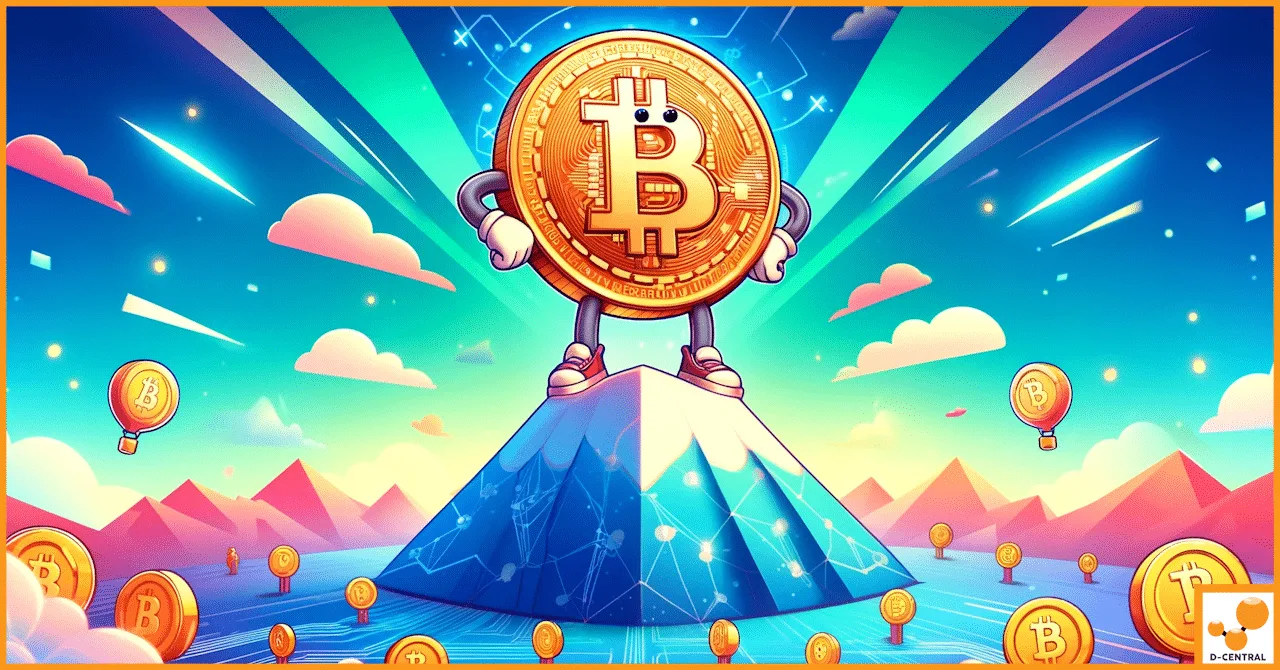
Why Every Miner Should Care About F2Pool’s $520K Paxos Incident
In a recent unprecedented event, F2Pool, a leading Bitcoin mining pool, found itself at the center of a heated debate.
4479 Desserte Nord Autoroute 440, Laval, QC H7P 6E2

Bitcoin, the first and most widely recognized cryptocurrency, was introduced in 2009 by an individual or group using the pseudonym Satoshi Nakamoto. Unlike traditional currencies, Bitcoin operates on a decentralized network called a blockchain. This technology is essentially a digital ledger of transactions distributed across a global network of computers. Each transaction is recorded in a “block” and linked to previous transactions, forming a chronological “chain.” This decentralized structure ensures that no single entity has control over the entire network, enhancing security and reducing dependency on centralized financial institutions.
Digital scarcity refers to the finite nature of digital assets, a concept that is relatively new in the digital world where most data can be easily and infinitely duplicated. In the realm of cryptocurrencies, digital scarcity is a critical feature because it creates a supply limit for tokens, which can help to maintain value and prevent inflation. This is akin to scarce physical resources like gold, which have historically been used as money due to their limited nature and broad acceptance as a store of value.
While blockchain serves as the foundation, it is Bitcoin’s unique application that showcases true digital scarcity. Blockchain technology, with its ability to create immutable and transparent records of transactions, is revolutionary in its own right. However, it is the specific implementation of this technology through Bitcoin that illustrates the full potential of digital scarcity. Bitcoin not only uses blockchain to record transactions but also strictly limits the creation of new coins, which underpins its value proposition as “digital gold.” This controlled supply contrasts sharply with traditional blockchain applications, which focus more on creating decentralized databases without necessarily limiting the token supply.
Blockchain technology is fundamentally a distributed digital ledger that records transactions across multiple computers in such a way that the registered transactions cannot be altered retroactively. This technology underpins cryptocurrencies like Bitcoin, but its application goes far beyond. Each ‘block’ in the chain contains a number of transactions, and every time a new transaction occurs on the blockchain, a record of that transaction is added to every participant’s ledger. The decentralised nature of this ledger makes it highly resistant to tampering and fraud, as it would require massive amounts of computing power to alter any aspect of the ledger on all copies simultaneously.
While blockchain is synonymous with cryptocurrencies, its potential extends to numerous other sectors. In healthcare, blockchain can secure the sensitive medical records of patients and ensure easy and safe access by authorized persons only. In supply chain management, it provides a transparent, unalterable record of the product journey from manufacturer to consumer, enhancing traceability, reducing losses from counterfeit and gray market, and improving regulatory compliance. Other sectors leveraging blockchain include real estate for streamlining transactions, the music industry for copyright management, and even in voting systems to increase transparency and reduce the possibility of fraud.
As a distributed ledger, blockchain is essentially a type of database but with unique characteristics like immutability and decentralization. This makes it ideal for applications where security, transparency, and unalterable records are paramount. However, the role of blockchain in creating scarcity is specific to its implementation in cryptocurrency. In these systems, blockchain not only records transactions but also enforces the rules of the network, such as the total supply of tokens. For instance, Bitcoin’s blockchain enforces a cap on the number of coins (21 million), which is a coded rule that cannot be changed without consensus from the network. This is in contrast to other blockchain applications where the technology serves as a secure, transparent, and efficient database without inherently limiting the availability of the asset or data being managed. This scarcity aspect is what differentiates cryptocurrencies from other blockchain applications, providing a digital analogy to finite resources like precious metals, which have historically held value due to their limited nature.
Bitcoin was introduced to the world in a 2008 white paper titled “Bitcoin: A Peer-to-Peer Electronic Cash System” written by an individual or a group of individuals under the pseudonym Satoshi Nakamoto. The creation of Bitcoin was driven by the desire to produce a means of exchange that could operate independently of centralized financial institutions which were perceived as unreliable and corruptible. This sentiment was particularly strong in the wake of the 2008 financial crisis, highlighting the dangers of bank failures and excessive trust placed in financial institutions. Bitcoin was designed to solve these issues by introducing a decentralized financial system where transactions could be processed on a peer-to-peer basis without the need for a central authority.
The Bitcoin whitepaper outlined a method for using a peer-to-peer network to create what was described as a system of electronic transactions without relying on trust. Nakamoto proposed the use of a decentralized ledger (blockchain), where transactions are verified by network nodes through cryptography and recorded in a public dispersed ledger. This was revolutionary as it eliminated the need for a central clearing authority, which is often a bank or government body, and addressed the double-spending problem inherent to digital currencies.
Bitcoin’s early days were marked by obscurity and a small base of enthusiasts who believed in the potential of a decentralized currency. The first known commercial transaction using Bitcoin occurred in 2010 when a programmer named Laszlo Hanyecz bought two pizzas for 10,000 bitcoins, an event now celebrated as “Bitcoin Pizza Day.” Over the years, Bitcoin gained visibility and traction among a wider audience, culminating in its recognition as a legitimate financial asset. The narrative around Bitcoin evolved from being a currency for internet transactions to a store of value or “digital gold,” particularly during times of economic uncertainty. Its capacity to bypass traditional financial systems and its built-in scarcity—mimicking the physical properties of metals like gold—have led to significant price increases and a robust market of investors and speculators engaging with the cryptocurrency.
Throughout its history, Bitcoin has sparked debates, regulatory scrutiny, and the development of thousands of other cryptocurrencies inspired by its underlying technology. Its growth from an experimental project to a major financial phenomenon reflects a shift in how money and value transfer are viewed in an increasingly digital global economy.
Digital scarcity refers to the limited availability of a digital asset, which can be enforced through software code. Unlike physical assets, which are naturally limited by material constraints, digital assets can be easily copied and shared infinitely without degradation. The concept of digital scarcity is significant because it introduces the economic principles of supply and demand to digital assets. By limiting the availability of a digital item, similar to rare collectibles or precious metals, digital scarcity can increase an asset’s perceived value and demand.
Bitcoin achieves digital scarcity through several key elements embedded in its design. At the core of its protocol is a fixed supply limit of 21 million coins, which is encoded into the software. This cap ensures that there will never be more than 21 million bitcoins in existence, mimicking the finite supply of resources like precious metals. Additionally, the process of “mining” bitcoins, which involves solving complex mathematical problems to verify transactions and secure the network, gradually introduces new bitcoins into the system at a decreasing rate. This mining process is also subject to an event known as the “halving,” which occurs approximately every four years and cuts the reward for mining new blocks in half, further limiting the rate at which new bitcoins are created.
The concept of scarcity in digital forms, such as Bitcoin, differs significantly from physical scarcity seen in assets like gold. Physical scarcity is governed by natural limitations; gold must be mined from the earth, and there is a finite amount that can be economically extracted. This scarcity is tangible and historically has been a reliable store of value. Digital scarcity, on the other hand, is not bound by physical constraints but is engineered through cryptographic techniques and consensus protocols. While gold’s value is underpinned by both its physical properties and its cultural and historical significance, Bitcoin’s value is derived from its technological innovation, network effects, and its perceived benefits as a decentralized asset. Despite these differences, both share the fundamental economic principle that limited supply can lead to higher value, provided there is sufficient demand. This makes Bitcoin, often referred to as “digital gold,” a modern interpretation of a scarce asset adapted for the digital age.
One of the fundamental aspects of Bitcoin that establishes its digital scarcity is the fixed supply limit of 21 million coins. This cap is hardcoded into Bitcoin’s source code, which means it cannot be changed without a consensus among network participants, a highly unlikely scenario given the widespread commitment to preserving this foundational feature. The fixed supply mirrors the scarcity of precious resources like gold, making Bitcoin a valuable digital asset that cannot be diluted by the creation of additional coins.
Bitcoin’s mining process is another critical component that contributes to its digital scarcity. Mining involves solving complex cryptographic puzzles to validate transactions and add new blocks to the blockchain. This process requires significant computational power and energy, thereby controlling the rate at which new bitcoins are generated. Every 210,000 blocks, or approximately every four years, a “halving” event cuts the reward for mining new blocks in half. Originally, miners received 50 bitcoins per block; this reward has decreased over time through several halvings to 6.25 bitcoins as of the last halving in 2020. The halving mechanism ensures that the release of new bitcoins slows down over time, further enforcing the scarcity as the total supply cap approaches.
Bitcoin transactions are immutable, meaning once they are recorded on the blockchain, they cannot be altered or erased. This immutability is safeguarded by the blockchain’s decentralized nature, where each node in the network maintains a copy of the ledger, creating a robust system of checks and balances that prevents tampering. Additionally, the consensus mechanism, specifically Proof of Work (PoW), plays a crucial role. For a transaction to be added to the blockchain, it must be verified by miners through PoW, which involves solving the cryptographic puzzles mentioned earlier. This consensus process not only secures the network but also upholds the integrity and scarcity of Bitcoin by ensuring that new coins are introduced into the system at a predictable and decreasing rate, and that all transactions are permanently recorded without the possibility of fraud or reversal.
Changing Bitcoin’s core protocol is an inherently difficult process, primarily due to its decentralized nature. Unlike centralized systems where a single authority can dictate changes, Bitcoin relies on the consensus of its community, which includes miners, developers, and users. For any change to be implemented, it generally requires an overwhelming majority agreement across the network, a process formalized through Bitcoin Improvement Proposals (BIPs). This requirement for broad consensus makes significant changes challenging and rare, ensuring that only well-vetted and widely supported updates are adopted. This high barrier to change is a key feature that contributes to the stability and security of Bitcoin.
Bitcoin’s governance is a model of decentralized decision-making which contrasts sharply with the centralized governance structures seen in traditional finance and corporate environments. In Bitcoin, decisions about changes to the protocol or network operations are made through community discussions, debates, and consensus. This decentralized approach ensures that no single party has unilateral control over the Bitcoin network, which not only enhances security by reducing points of failure but also aligns with the philosophical underpinnings of Bitcoin as a democratized financial system. This governance model emphasizes transparency, open participation, and majority rule.
Bitcoin’s capped supply of 21 million coins is a foundational feature that has profound economic implications. This limit mimics the scarcity of precious metals like gold, adding an economic incentive for holders and potential buyers due to its limited availability. Economically, this scarcity can lead to deflationary tendencies where the value of each bitcoin could increase as demand rises against a fixed supply, particularly as the global economy inflates. This deflationary aspect makes Bitcoin an attractive hedge against inflation, similar to other finite resources that have historically preserved value over time.
The scarcity of Bitcoin also has significant psychological effects on its investors and users. Knowing that the supply of Bitcoin is limited often creates a sense of urgency and a fear of missing out (FOMO) among potential buyers, which can drive market demand and price increases. This scarcity can also lead to a hoarding mentality, where investors hold onto their bitcoins in anticipation of increased value over time, rather than using them as a medium of exchange. Additionally, during market downturns, the finite nature of Bitcoin can reinforce its perceived value, providing psychological comfort to holders who view their investment in the context of long-term finite supply.
In modern finance, Bitcoin has increasingly been referred to as “digital gold.” This analogy stems not only from its properties of scarcity and durability (in terms of its ability to exist perpetually in the digital realm) but also from its potential to act as a store of value. Like gold, Bitcoin is seen as a safe haven during economic uncertainty. Its independence from governmental control and inflationary policies makes it attractive as a diversification tool in investment portfolios. As Bitcoin matures and becomes more integrated into financial systems, its role as digital gold becomes more cemented, influencing how investors and financial analysts perceive and integrate it into traditional financial frameworks.
Overall, Bitcoin’s scarcity is central to its value proposition, influencing economic models, investor behavior, and its integration into broader financial systems. This scarcity, enforced by its unchangeable cap, ensures that Bitcoin remains a key player in the evolution of digital currencies and their role in global economics.
Bitcoin’s unique characteristic as a truly scarce digital asset sets it apart in the realm of cryptocurrencies and broader financial markets. Its hard-capped supply of 21 million coins, dictated by its foundational code, ensures that it cannot be diluted or replicated beyond this limit. This built-in scarcity, similar to that of precious metals but unique in the digital world, has established Bitcoin not only as a pioneer in the cryptocurrency space but also as a model for others that have followed.
Looking ahead, the role of Bitcoin and blockchain technology is poised to expand further. As digital currencies continue to evolve, Bitcoin is likely to maintain its stature as “digital gold,” particularly in times of economic volatility and as a hedge against inflation. The underlying blockchain technology, recognized for its ability to secure data and create transparency in transactions, is expected to find new applications beyond finance, including in areas such as supply chain management, healthcare, and voting systems, potentially transforming how industries operate by enhancing security and reducing inefficiencies.
The landscape of digital currencies is continually evolving, with Bitcoin at the forefront of this transformation. As new technologies emerge and the global economy becomes increasingly digitized, Bitcoin’s influence as a stable, scarce, and decentralized asset is likely to grow. Moreover, as public understanding of digital currencies improves and regulatory frameworks develop, we can expect greater integration of cryptocurrencies into everyday financial practices. This evolution will likely spur further innovations and adaptations in the cryptocurrency space, ensuring that digital currencies remain a dynamic and integral part of the global financial ecosystem.
In conclusion, Bitcoin’s journey from a conceptual experiment to a cornerstone of digital finance underscores its revolutionary impact. Its continued role in shaping the future of digital transactions and its enduring legacy as the first cryptocurrency to introduce the world to the concept of digital scarcity will likely be studied and revered for generations to come.
What is Bitcoin and how does it work?
Bitcoin is a decentralized digital currency that operates without the oversight of a central authority. Transactions are recorded on a blockchain, a public ledger distributed across a network of computers. Bitcoin uses cryptography to secure transactions, which are verified by network nodes and recorded in blocks on the blockchain.
What makes Bitcoin unique compared to traditional currencies?
Bitcoin’s decentralized nature means it operates without a central authority, making it immune to government interference or manipulation. Its blockchain technology ensures security, transparency, and immutability of transactions. Further, Bitcoin introduces the concept of digital scarcity, with a cap of 21 million coins, differentiating it from fiat currencies that can be printed indefinitely.
How does blockchain technology work?
Blockchain technology is a decentralized digital ledger that records transactions across multiple computers. This ensures that once a transaction is recorded, it cannot be altered retroactively without consensus from the network, offering a high level of security and transparency.
Can Bitcoin be used in various sectors beyond cryptocurrency?
Yes, blockchain, the technology underpinning Bitcoin, has applications beyond cryptocurrencies. It can secure medical records, enhance supply chain transparency, streamline real estate transactions, manage copyrights in the music industry, and even improve voting systems by increasing transparency and reducing fraud.
What is digital scarcity and how does Bitcoin achieve it?
Digital scarcity refers to the limited availability of a digital asset, enforced through code. Bitcoin achieves digital scarcity through a hard cap of 21 million coins, controlled release via mining, and the halving mechanism, which cuts the reward for mining in half approximately every four years, further limiting the rate of new Bitcoin creation.
How does the “halving” mechanism affect Bitcoin?
The “halving” mechanism reduces the reward for mining new Bitcoin blocks by half approximately every four years. This process slows the rate at which new bitcoins are created and introduced into the system, contributing to Bitcoin’s scarcity and potentially increasing its value as the supply cap approaches.
What are the implications of Bitcoin’s scarcity?
Bitcoin’s scarcity can lead to deflationary tendencies, increase its value as demand rises, and make it an attractive hedge against inflation. It also affects investor psychology, encouraging long-term holding due to its finite supply and potential for price increases.
Why is Bitcoin referred to as “digital gold”?
Bitcoin is often called “digital gold” due to its properties of scarcity, durability, and the role it plays as a store of value, similar to gold. It serves as a hedge against economic uncertainty and inflation, appealing to investors looking for assets that can preserve value over time.
DISCLAIMER: D-Central Technologies and its associated content, including this blog, do not serve as financial advisors or official investment advisors. The insights and opinions shared here or by any guests featured in our content are provided purely for informational and educational purposes. Such communications should not be interpreted as financial, investment, legal, tax, or any form of specific advice. We are committed to advancing the knowledge and understanding of Bitcoin and its potential impact on society. However, we urge our community to proceed with caution and informed judgment in all related endeavors.
Related Posts

In a recent unprecedented event, F2Pool, a leading Bitcoin mining pool, found itself at the center of a heated debate.

In the ever-evolving landscape of cryptocurrency mining, the efficiency and longevity of mining hardware stand as pivotal factors determining the

The landscape of cryptocurrency mining has undergone significant transformations since the inception of Bitcoin in 2009. What began as a